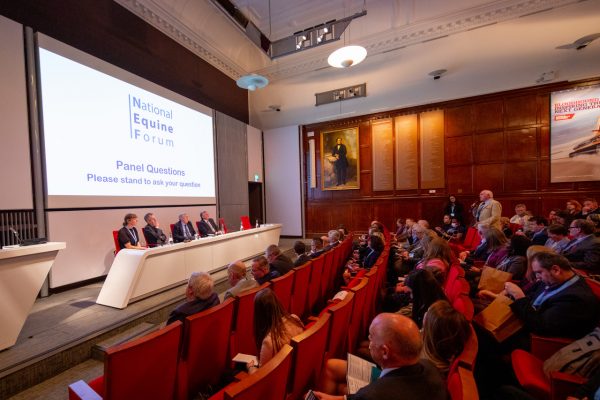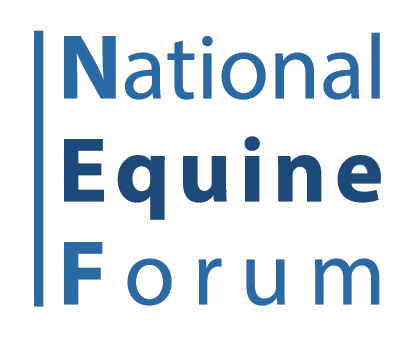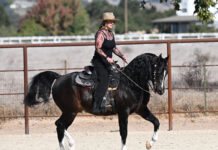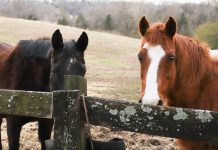The 28th National Equine Forum, held in London earlier this month, sparked animated interaction from around the globe. As well as attracting delegates from many of the UK’s leading equestrian organisations on the day, the event was livestreamed in 23 countries and generated unprecedented social media engagement.
Leading names in the veterinary, charitable and equestrian sectors shared their knowledge and encouraged discussion to help the industry move forward in the best way for our horses.
This year’s programme covered a diversity of topics from disease risks, the donkey skin trade and social licence, to rights of way, behavioural change and preparations for the Tokyo Olympics. All sessions can be viewed on NEF’s YouTube channel https://www.youtube.com/c/nationalequineforum
New this year was the introduction of the audience participation tool Sli.do to improve and maximise audience interaction. 420 users submitted questions, a number of which were answered in the Q&A panels after some of the sessions. Many unanswered questions will be addressed via podcasts with the speakers later this year. Livestream viewings were doubled from last year and Facebook engagement exceeded 20k on some posts.
“The Forum is all about being the facilitator of knowledge to the industry,” said Georgina Crossman, NEF convener. “Building our audience is the best way to ensure the right information reaches as many people as possible. We thank you all for your support, engagement and interaction. We look forward to keeping you updated throughout the year and welcoming you back for NEF 2021.”

Lord Gardiner of Kimble Parliamentary Under Secretary of State (Minister for Rural Affairs and Biosecurity), Defra presented The Defra view of the horse industry in a changing world. A key announcement was that the Central Equine Database will shortly allow owners to update their details, and their horse’s details, online via the Digital Stable, ahead of the microchipping (for horses born before 2009) deadline of 1 October 2020.
Dr Richard Newton Director of Epidemiology and Disease Surveillance, AHT discussed Managing Infectious disease risks: recent experiences and thoughts. He explained strategies to minimise the chances of disease risk, using the recent equine influenza, equine viral arteritis (EVA) and EHV-1 outbreaks as examples. David Mountford Chair of the British Horse Council and Dr Sheila Voas Chief Veterinary Officer for Scotland, Scottish Government contributed to the panel Q&A session afterwards.
James Hick Chief Executive of the British Horse Society talked about Equestrian access: Critical now and beyond 2026. He urged riders to support the BHS campaign to save more safe riding routes before they disappear.
Ian Cawsey Director of Advocacy and Campaigns at The Donkey Sanctuary discussed Disappearing donkeys: The impact of the donkey skin trade. He outlined the gravity of the situation worldwide and emphasised that we have to change what they do otherwise a 6th mass species extinction was on the cards.
Roly Owers Chief Executive of World Horse Welfare explored Our future with horses: A sure thing? How social licence can help us. He stressed that the responsible use of horses in sport and recreation is about the horse-human partnership, and it is an imperative collective responsibility to demonstrate this at all times, to build trust and help with public perception.
Dr Barry Johnson Independent Chair of British racing’s Horse Welfare Board presented A living example of social licence explaining British racing’s recently launched Welfare Strategy, to show how we are becoming more rigorous in doing right for our horses.
Dr Zac Baynham-Herd, Professor Sarah Freeman, David Rendle and Andrew and Abigail Turnbull discussed Improving equine health and welfare by changing our behaviour. Dr Baynham-Herd outlined four strategies – easy, timely, social and attractive – to encourage or discourage certain behaviours. Professor Freeman showed how the colic REACT collaborative educational campaign is helping to make a change to owner behaviour. David Rendle explained that unless we fully address the alarming issue of anthelmintic resistance we are in danger of putting horse health at grave risk. Andrew and Abigail Turnbull spoke about their recent experience of a strangles outbreak at their premises, Richmond Equestrian Centre, and how their forthright approach contained the outbreak, increased respect, raised awareness and reduced the strangles stigma.
Tim Hadaway Director for Games Operations, Fédération Equestre Internationale (FEI) discussed All set for Tokyo 2020. He spoke about the preparation work being undertaken and reiterated that the Games location in the middle of the Olympic city has great potential to showcase the sport.
Henry Bullen Director of Peden Bloodstock spoke about Tokyo: Prepped and ready to fly. He explained how horses are transported and the rigorous health, safety and security measures taken.
Kirsty Withnall RSPCA Inspector with the RSPCA Special Operations Unit discussed Multi-agency collaboration in equine welfare cases. She spoke about the complex work behind large scale rescue cases, stating that there are many success stories of rescued horses enjoying a full recovery, but it is really dependent upon a collaborative approach and making sure all protocols are followed.
Nigel Oakley, tireless protector and promoter of the Suffolk Punch horse and Eleanor Jones, the indefatigable Horse & Hound journalist with a passion for equine welfare, were announced as the joint winners of the Sir Colin Spedding Award.
You can watch all the presentations and discussions on the NEF’s YouTube channel https://www.youtube.com/c/nationalequineforum











